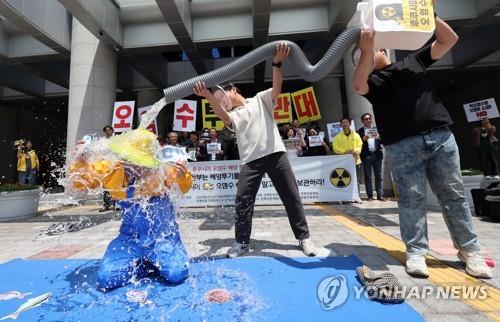- California Assembly OKs highest minimum wage in nation
- S. Korea unveils first graphic cigarette warnings
- US joins with South Korea, Japan in bid to deter North Korea
- LPGA golfer Chun In-gee finally back in action
- S. Korea won’t be top seed in final World Cup qualification round
- US men’s soccer misses 2nd straight Olympics
- US back on track in qualifying with 4-0 win over Guatemala
- High-intensity workout injuries spawn cottage industry
- CDC expands range of Zika mosquitoes into parts of Northeast
- Who knew? ‘The Walking Dead’ is helping families connect
IMO reviewing measures to respond to Japan’s Fukushima water release: agency chief
The U.N. maritime safety agency is reviewing measures to respond to Japan’s planned release of contaminated water from the Fukushima nuclear power plant, though further discussions are needed to decide whether to deal with the issue within the London Convention and Protocol framework, the agency chief said Wednesday.
Japan plans to discharge radioactive water from the Fukushima Daiichi nuclear power plant, which was crippled by a massive 2011 earthquake and tsunami, into the sea as early as this month, according to foreign media reports.
South Korea has called for discussions on the potential impacts of the planned release on the marine environment within the London Convention and Protocol framework under the International Maritime Organization (IMO).
But Japan has refuted the call, claiming that such a discharge should not be seen as an act of marine dumping.
“Member nations differ on the interpretation of the issue. Some say the International Atomic Energy Agency is supposed to deal with the issue, while others say it should be viewed in terms of the definition of dumping and within the scope of the LC/LP,” IMO Secretary-General Lim Ki-taek told a press interview in Seoul.
“Policy measures among the parties concerned can be discussed during the next round of meetings. Apart from that, we are reviewing what the IMO can do (with regard to the Fukushima issue),” Lim said, without elaborating further.

According to a document drawn up after a Protocol meeting in October 2022, the IMO said it is “not certain” that a broad interpretation of the London Protocol would consider that such a disposal would fall within the scope of the treaty, the ministry said in a release.
The London Convention, which has been in force since 1975, is meant to promote the effective control of all sources of marine pollution and to take steps to prevent marine pollution by the dumping of waste and other matter.
In 1996, the London Protocol was agreed in order to modernize the Convention, and it prohibits all dumping, with some exceptions.
Cho Seung-hwan, South Korean minister of oceans and fisheries, on Wednesday reiterated the need to have discussions among the Protocol’s contracting members on the Fukushima case, while vowing continued close consultations with Japan and measures to beef up monitoring of its potential impacts.

The planned release has sparked concerns among nations, particularly over the safety of imported seafood.
South Korea banned all seafood imports from eight Japanese prefectures near Fukushima in 2013 on concerns over their radiation levels in the wake of the meltdown incident in 2011.
In May, South Korea sent a team of experts and government officials to Fukushima for a six-day on-site inspection, through which it achieved “meaningful progress” but additional analysis is needed for a more accurate conclusion regarding the matter.
The International Atomic Energy Agency plans to issue a final safety assessment of Japan’s plan at the end of this month.
Speaking of its recent resolution condemning North Korea for missile launches, Lim said the move carries significance as it is the first time for the agency to adopt a resolution against a specific member nation.
“The resolution itself would not have direct, practical impacts, but each step by an international agency has significant diplomatic meanings,” Lim said.
He, however, did not give detailed steps that the IMO may take against a North Korean missile firing, saying it is a political issue to be dealt with by the U.N. Security Council.
On May 31, the IMO adopted its first-ever resolution “strongly” condemning North Korea for a series of missile launches, just hours after the North made an botched attempt to put its first military spy satellite into orbit.
A resolution is considered the strongest recommendation by the IMO to its member states.
Previously, it had stopped short of adopting circulars three times — in 1998, 2006 and 2016 — to express concerns over missile launches without prior notification.
In response, Pyongyang denounced the resolution as “unfair and illegal,” and hinted it may forgo a prior notice to the IMO for future satellite launches.
Lim, a former South Korean oceans and fisheries ministry official, is in South Korea to attend Korea Maritime Week and the ministerial conference under way in Seoul for a three-day run through Friday, where experts and industry and government officials from dozens of nations will discuss ways to better protect the marine environment and boost cooperation on digitalization in the maritime industry, as well as autonomous surface ships.
The international maritime week event has been held on an annual basis since 2017 to discuss key issues on maritime safety and the marine environment.











